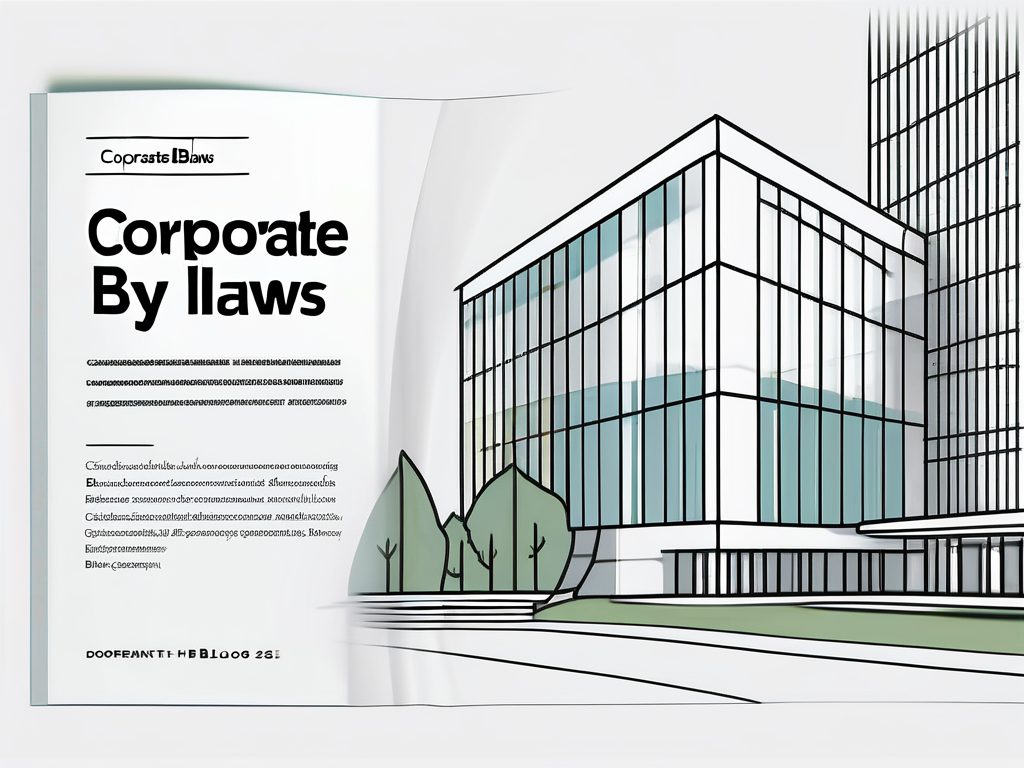Corporate bylaws are an essential component of any company’s structure and operations. They serve as a set of rules and regulations that govern the internal affairs of a corporation. Understanding the basics of corporate bylaws is crucial for both shareholders and employees to ensure a smooth functioning of the company. This comprehensive explanation will delve into the definition, purpose, legal framework, key components, drafting process, conflict resolution, and impact of corporate bylaws on company culture.
Understanding the Basics of Corporate Bylaws
Definition and Purpose of Corporate Bylaws
Corporate bylaws are a legal document that outlines the rules, procedures, and responsibilities that guide the internal operations of a corporation. They are typically drafted by the board of directors and provide a framework for decision-making, shareholder rights, and corporate governance. Bylaws function as a contract between the company and its stakeholders, ensuring transparency, accountability, and compliance.

Corporate bylaws also serve as a roadmap for resolving conflicts within the organization, establishing protocols for dispute resolution, and outlining the process for making important business decisions. They help maintain order and consistency in corporate operations, promoting a clear understanding of roles and responsibilities among all parties involved.
The Legal Framework Surrounding Corporate Bylaws
Corporate bylaws are governed by state corporate laws and must align with the requirements and regulations of the jurisdiction in which the corporation is registered. While specific laws may vary, bylaws generally cover areas such as the composition and authority of the board of directors, shareholder meetings, officer roles, and procedures for amending the bylaws. Compliance with these legal requirements is essential to maintain the company’s legal standing and protect the rights of shareholders.
Furthermore, corporate bylaws play a crucial role in establishing the internal structure of the corporation, including the delegation of powers, responsibilities, and decision-making processes. They help create a system of checks and balances within the organization, ensuring that no single individual or group has unchecked authority. This framework promotes accountability and ethical behavior, safeguarding the interests of both the company and its stakeholders.
Key Components of Corporate Bylaws
Identifying the Board of Directors
The board of directors is a central element of corporate governance. Bylaws define the number of directors, their qualifications, terms of office, and powers. These provisions ensure that the board operates effectively, represents shareholder interests, and makes informed decisions on behalf of the company. It is also common for bylaws to outline requirements for board meetings, including notice periods, quorum, and voting procedures.

Furthermore, the bylaws may specify the committees that the board of directors can establish, such as audit committees, compensation committees, and governance committees. These committees play a crucial role in overseeing specific aspects of the company’s operations and providing guidance to support the board in its decision-making processes.
Defining Shareholder Meetings
Shareholder meetings are crucial for corporate decision-making and communication. Bylaws establish procedures for calling and conducting these meetings, including the required notice period, agenda items, and voting rules. They may also include provisions for proxy voting, absentee voting, and the use of electronic communication to facilitate shareholder participation and engagement.
In addition, the bylaws may outline the rights and responsibilities of shareholders, including information on dividend distributions, share transfer procedures, and shareholder voting rights. These provisions help ensure transparency and fairness in the relationship between the company and its shareholders, fostering trust and accountability within the organization.
Outlining Corporate Officers’ Roles
Corporate officers play key roles in managing the day-to-day operations of the company. Bylaws define the positions, responsibilities, and authority of officers such as the CEO, CFO, and secretary. These provisions ensure clarity and accountability in the organization’s leadership structure, including the delegation of powers, appointment processes, and terms of office for officers. Bylaws may also outline procedures for officer removal and succession planning.
Moreover, the bylaws may detail the indemnification and insurance provisions for corporate officers and directors, protecting them from personal liability in certain situations. These provisions help attract qualified individuals to leadership positions and provide them with the confidence to make decisions in the best interests of the company without fear of personal financial risk.
The Process of Drafting Corporate Bylaws
Preliminary Considerations for Drafting Bylaws
Before drafting corporate bylaws, it is essential to conduct a thorough analysis of the company’s needs, goals, and legal requirements. This includes considering the size of the corporation, the number and nature of its shareholders, its industry regulations, and any unique circumstances that may impact its operations. Collaboration between legal advisors, management, and stakeholders is crucial in crafting comprehensive and effective bylaws.

During this preliminary phase, it is important to delve into the company’s history and culture to understand its values and vision. By understanding the company’s past and present, the drafters can ensure that the bylaws align with the organization’s overall mission and objectives. This process may involve conducting interviews with key stakeholders, reviewing past legal documents, and analyzing industry trends to gain a holistic understanding of the company’s needs.
Essential Clauses to Include
While the specific content of corporate bylaws may vary, certain clauses are typically included to address common areas of corporate governance. These may include provisions on shareholder rights, director qualifications, meeting procedures, voting requirements, stock issuance, and dividend distribution. Bylaws should also address conflicts of interest, indemnification, and dissolution procedures to provide guidance in various scenarios.
When drafting these essential clauses, it is important to strike a balance between specificity and flexibility. The bylaws should provide clear guidelines and procedures, but also allow for adaptation to changing circumstances. This flexibility ensures that the company can navigate unforeseen challenges while maintaining compliance with legal and regulatory requirements.
Reviewing and Revising Corporate Bylaws
Corporate bylaws should not be static documents. They should be periodically reviewed and updated to reflect changes in the company’s operations, legal requirements, and best practices. Regular evaluation ensures that the bylaws remain relevant, effective, and in compliance with the law. Any amendments or revisions to the bylaws should follow prescribed procedures, such as board approval and shareholder consent when necessary.
During the review process, it is essential to engage with legal advisors and other relevant stakeholders to gather insights and perspectives. This collaborative approach helps identify areas for improvement and ensures that the bylaws continue to meet the evolving needs of the company. By regularly revisiting and revising the bylaws, the company demonstrates its commitment to good governance and adaptability in a dynamic business environment.
The Role of Corporate Bylaws in Conflict Resolution
Bylaws as a Guide in Disputes
Conflicts and disputes are inevitable in any organization. Corporate bylaws serve as a guide for resolving conflicts by providing clear procedures for dispute resolution. These procedures may include mediation, arbitration, or other mechanisms to preserve the interests of all parties involved. By following the established bylaws, companies can navigate disputes with transparency, fairness, and adherence to legal requirements.
Moreover, corporate bylaws not only outline the steps to be taken in the event of a conflict but also establish a framework for preventing disputes from escalating. By setting out guidelines for communication, decision-making, and governance, bylaws can proactively contribute to a harmonious work environment and preempt potential conflicts before they arise.
Amending Bylaws to Resolve Conflicts
In certain cases, conflicts may arise due to gaps or inadequacies in the existing bylaws. When faced with such situations, companies can consider amending the bylaws to address the specific issue at hand. By following the prescribed procedures for amendment, which typically involve board and shareholder approval, companies can adapt their bylaws to suit evolving needs and circumstances, thereby facilitating conflict resolution.
It is essential for companies to periodically review and update their bylaws to ensure that they remain relevant and effective in addressing potential sources of conflict. By engaging in a regular review process, organizations can proactively identify areas for improvement and make necessary adjustments to enhance clarity and effectiveness in conflict resolution mechanisms outlined in the bylaws.
The Impact of Corporate Bylaws on Company Culture
Bylaws and Corporate Governance
Corporate bylaws play a vital role in shaping and promoting a culture of strong corporate governance. They establish the framework for ethical conduct, accountability, and transparency within the organization. By clearly outlining roles, responsibilities, and decision-making processes, bylaws contribute to a culture of trust and integrity, which is essential for the long-term success and sustainability of any corporation.
Bylaws and Employee Relations
Corporate bylaws also influence employee relations and contribute to a positive organizational culture. By defining codes of conduct, employee rights, and relationships between management and employees, bylaws provide a sense of clarity, fairness, and stability. Employee satisfaction, engagement, and productivity can be enhanced when employees understand their rights and have confidence in the company’s commitment to ethical practices.
Moreover, corporate bylaws serve as a guiding light for companies in times of crisis or uncertainty. During periods of rapid change or external challenges, bylaws provide a steady framework for decision-making and behavior, ensuring that the company stays true to its values and principles. This consistency and reliability can help employees, investors, and other stakeholders navigate turbulent times with confidence and trust in the organization’s leadership.
Additionally, corporate bylaws can also impact the recruitment and retention of top talent within a company. Prospective employees often look at a company’s governance structure and bylaws to gauge the organization’s commitment to fairness, transparency, and ethical practices. Companies with well-defined and robust bylaws are more likely to attract high-caliber candidates who value a strong corporate culture and ethical standards.
In conclusion, corporate bylaws are a critical element of any corporation’s governance structure. Understanding their definition, purpose, legal framework, key components, drafting process, conflict resolution, and impact on company culture is crucial for all stakeholders. By adhering to well-crafted bylaws, companies can promote transparency, compliance, and effective decision-making, ensuring the long-term success and sustainability of the organization


